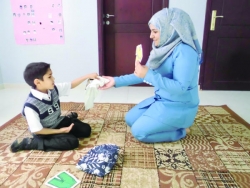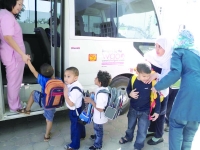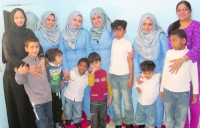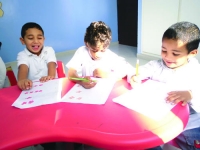Oman Observer
By Ali Ahmed al Riyami
 Nations are judged by how well they care for their minorities and in the case of children with special needs, there has been increased focus given here by public authorities, — mainly the Ministry of Social Development — non-government organisations (NGO’s), and concerned individuals, and yet there is still much to do so as to ensure that no one is left out.
Nations are judged by how well they care for their minorities and in the case of children with special needs, there has been increased focus given here by public authorities, — mainly the Ministry of Social Development — non-government organisations (NGO’s), and concerned individuals, and yet there is still much to do so as to ensure that no one is left out.
This is certainly the case for Omani children suffering from autism where studies in this field have been limited to those performed by Dr Yahya al Farsi, Marwan al Sharbati, Omar al Farsi, Mohammed al Shafaee, Daniel R Brooks and Mostafa Waly, in the Journal of Autism and Developmental Disorders (2011), and Dr Yahya al Farsi, Mostafa Waly, Marwan al Sharbati, Mohamed al Shafaee, Omar al Farsi, Samiya al Fahdi, Allal Ouhtit, Maha al Khaduri and Samir al Adawi, in the Brief Report: Variation in Socio-Economic Burden for Caring of Children with Autism Spectrum Disorder in Oman: Caregiver Perspectives (2012).
With only one centre available for autistic children — the Muscat Autism Centre, in Athaiba — throughout Oman, low-income parents with autistic children are at a loss as to where they can send their children for the specialised training and education that they so sorely need. Those who can afford to are able to send them to specialised centres abroad.
As noted by Mashear Shamsan, a Psychologist and the Director of Muscat Autism Centre, in a recent interview with the Observer, “We are in the unfortunate position of having to reject applications due to lack of space at the Centre.”
The privately funded Centre started out in 2008 with only three autistic children at their location in Bousher before moving to larger premises in Qurum in 2010, where they cared for six children, and then to their current location in Adhaiba, where they give specialised diagnostic evaluation and rehabilitation for thirty children with Autism Spectrum Disorder and provide them with an individual educational plan (IEP) that involves intervention in learning, behaviour, language and communication skills.
“The hope is”, she added, “that we will be able to have a bigger fit for purpose Centre at the end of this year or early next year. We desperately need more funds for this, as well as more trained teachers and accommodation for them and children living in far away townships.
 “We were lucky enough to have a bus donated to us by the Women’s Guild in Oman (WGO) and we thank the good efforts of Sally Sleep for this and for the continued interest she has shown.” In response to Observer enquires, Dr Yahya al Farsi, from the Department of Family Medicine and Public Health, College of Medicine and Health Sciences, Sultan Qaboos University (SQU), clarified what autism is and how it differs from other mental dysfunctions.
“We were lucky enough to have a bus donated to us by the Women’s Guild in Oman (WGO) and we thank the good efforts of Sally Sleep for this and for the continued interest she has shown.” In response to Observer enquires, Dr Yahya al Farsi, from the Department of Family Medicine and Public Health, College of Medicine and Health Sciences, Sultan Qaboos University (SQU), clarified what autism is and how it differs from other mental dysfunctions.
He said, “Autism Spectrum Disorder (ASD) and autism are both general terms for a group of complex disorders of brain development. These disorders are characterised, in varying degrees, by difficulties in social interaction, verbal and nonverbal communication and repetitive behaviours. It differs from other mental disorders in that it does not necessarily have to be associated with low IQ or mental retardation. On the contrary, people with autism can be extremely intelligent and gifted.”
With regard to the estimated prevalence of autism here in Oman and existing facilities for people with autism, he noted, “In year 2010, we conducted a study that showed the prevalence of diagnosed cases of autism has been estimated to be 1.4 cases per 10,000 children who were below 15 years old. This estimate would be translated in having one diagnosed autism case in every 5000 children who are below 15 years.
“Nonetheless, experts believe the number of non-diagnosed cases of autism is substantial and has not been detected yet due to under-diagnosis and under-reporting of autism cases in Oman.”
He pointed out, “Children with autism require special curriculum that can help them to progress with their language and social development. More importantly, teachers in Oman need to be educated about the needs of children with autism and the special techniques of educating them.”
With regard to parents of autistic children, he said, “Parents of children with autism face many challenges. They range from being financial to having enough to respond to the needs of children. In September 2012, we published a research paper that highlights the social and economic burden on caregivers of children with autism.”
In respect to regular school integration, Dr Yahya noted, “Children with autism are broadly classified in high functioning and low functioning autistics. The high functioning autistics (who constitute roughly 30 per cent) can be integrated in normal schools. A good proportion of the low functioning autistics can also be integrated in normal schools, but with extra facilities that will be appropriate for them.
 “It is important for people with autism to be integrated in the society. All barriers to their integration are centered around the fact that society is not fully aware about autism, 1358502690997304900 its nature, and how to interact with a child with autism.”
“It is important for people with autism to be integrated in the society. All barriers to their integration are centered around the fact that society is not fully aware about autism, 1358502690997304900 its nature, and how to interact with a child with autism.”
“I think that families who take care of children with autism need urgent support as follows:
1. Some families need financial support to cover for expenses.
2. A center of excellence for care of children with autism is needed, so children can be evaluated and diagnosed on solid medical and scientific background.
3. Service centres are needed in all areas in the Sultanate. This can be achieved by upgrading the current social welfare centres to cover services for autistic children.
4. There is an urgent need to train qualified social workers, psychotherapist, teachers, and doctors in how to take care of children with autism.”
Shamsan also noted the urgent need of promoting awareness. She said, “One of the main problems we have faced is that due to lack of awareness parents delay bringing their children to the Centre. It is best to start giving specialised care to autistic children from a young age so that they develop and hopefully integrate into regular schools.
“We have held awareness campaigns and used the media to alert more people. We have introduced early intervention so that children as young as three receive care and their developmental progress is significant.
Next year we are hoping to send two or three of our children to a nearby regular school on a part-time basis and see how well they fit in.
“It is very important for autistic children to be able to mix with and integrate with children at regular schools, but prior to this they should spend a couple of years at the Centre so that they can receive the special attention they require to do so.
“Autistic children have a very strong memorisation capacity and highly developed perception that responds to pictorial visualisation. This is why it is necessary to use different methods so as to engage and retain their attention or else they will quickly get bored.
Some parents of autistic children gave their comments: One anguished mother, Moza bint Saleh al Kharusiya noted, “My son Mohamed has autism he is 3 years and 6 months now and he is still not talking. He has a strange attitude and likes to do something and repeat it many times over, even one hundred times.
“It’s very difficult to deal with him as we don’t know what he wants. He likes to stay alone; he doesn’t play with other kids.”
“We didn’t know what we should do with our child; it’s so difficult and no one told us what to do with him and how to deal with him. It seems no one knows; I just heard from a friend of mine about Muscat Autism Centre.
 “There isn’t any support from the government. We need more centres more clinics and specialists on autism. The amount of kids with autism is increasing at a high rate, so the Ministry of Health must check out why and what are the reasons for the spread of autism in Oman. Before, no one knew what autism is, but now it’s a common thing everywhere; specially births in 2009 with so many kids having it and we don’t know why “We mothers and fathers hope to get solutions for our problem. We need bigger centres with more specialists controlled under the Ministry of Social Development, because not all citizens can afford the fees, the Centre is too small and has lots of kids.”
“There isn’t any support from the government. We need more centres more clinics and specialists on autism. The amount of kids with autism is increasing at a high rate, so the Ministry of Health must check out why and what are the reasons for the spread of autism in Oman. Before, no one knew what autism is, but now it’s a common thing everywhere; specially births in 2009 with so many kids having it and we don’t know why “We mothers and fathers hope to get solutions for our problem. We need bigger centres with more specialists controlled under the Ministry of Social Development, because not all citizens can afford the fees, the Centre is too small and has lots of kids.”
Abu Abdullah also commented on the difficulties and problems he and his wife face as parents having to raise a child with autism. He said, “You have to be patient because it’s long-term treatment and unlike other problems where a day at the surgery is enough.
“We both have to co-operate as parents of an autistic child, as well as family members, special need centres and hospitals. The government has to give financial support and we all have to be like a team, so difficulties and problems will be lessened. Parents alone cannot manage the situation.”
He only found out about his child’s autism when his child was two and a half years old, noticing lack of speech and eye contact. When they took him to hospital, the doctor was able to diagnose him as autistic. “At that time not many people knew about it and for us, with him being our first child, we thought it was something easy to treat.
“Although treatment is available here it needs improvement to match that offered in other countries. There should also be special lab tests for diagnosing children with autism. Some parents spend a lot of money to get these kinds of facilities outside of the county, while others cannot afford to. We hope to get more support from the government because autism treatment is very costly.”
in other countries. There should also be special lab tests for diagnosing children with autism. Some parents spend a lot of money to get these kinds of facilities outside of the county, while others cannot afford to. We hope to get more support from the government because autism treatment is very costly.”
The eOman government portal states that the Sultanate of Oman spares no effort in supporting disabled members of its society. And in response to Observer queries, the Ministry of Social Development responded by noting:
• The Ministry of Social Development co-operated with the Kuwait Centre for Autism to provide training to 25 employees from Al Wafa Social Service Centre and two employees from the Disabled Child Care Association. The trainees receive occupational diplomas on autism.
• The Ministry issued permits for two new autism specialising centres to rehabilitate autistic people
• The Ministry is a member of the Gulf Autism Union and is in communication with other unions for the exchange of expertise
• The rate of autism in the Sultanate is 1.4 among 10,000 children. There is only primary diagnosis for this and there are no specialised bodies for this.
(Sketch by Fahad al Zadjali; photos by Ali al Riyami and courtesy of Muscat Autism Centre)

Get Social